Blake Charlton, M.D., Author & Cardiologist Fellow at the University of California, San Francisco
by Liz Attebery
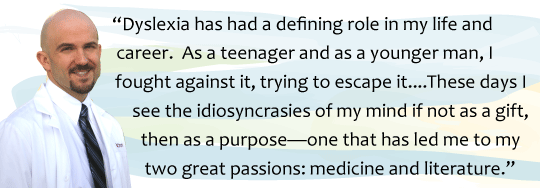
Blake Charlton is the author of the Spellwright Trilogy, a critically acclaimed fantasy series. Charlton graduated from the Stanford University School of Medicine in 2013 with Scholarly Concentrations in Biomedical Ethics and Medical Humanities, and is now a resident physician in the Internal Medicine program at the University of California San Francisco hospital. While attending Yale University as an undergrad, he won many awards for his academic achievements and work in the community, including the John Spangler Nicholas Scholarship, for greatest academic achievement and service to the community, and the Mifflin Prize for “general excellence in the English major.” He graduated summa cum laude and Phi Beta Kappa in 2002.
Blake Charlton would appear to have it all. A summa cum laude graduate of Yale University, a graduate of Stanford Medical School, and a published author, whose debut novel, Spellwright, was released to glowing reviews from the science fiction community and the publishing industry at large. The novel was the first of a nearly finished trilogy published by Tor Books. Set in a world where words can be physically peeled off a page and used to cast spells, Spellwright relates the misadventures of a wizard named Nicodemus Weal, who has a gift for producing magical language, but a disability that makes any text he touches misspell, with devastating consequences.
Like his protagonist, Blake knows how it feels to be a poor speller. Diagnosed with severe dyslexia as a child, he struggled with spelling, reading, and mathematics and spent most of elementary school in special education. His parents, both psychiatrists, suspected early on that their son had a learning disability because his spoken vocabulary was far superior to his reading capacity. A self-described spectacular failure at reading-related activities in kindergarten, Blake concealed his inability to read throughout first grade by watching his classmates and memorizing the order of words they read. His ploy came to light one day near the end of that year, when the cards students were reading from fell to the floor and he picked them up, reading what he had memorized despite the fact that cards were then upside down.
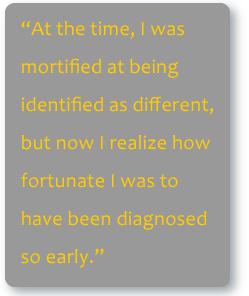 “Soon afterward,” he recalls, “I was pulled out of the classroom for extensive testing. By then, I knew something was up.” After being diagnosed, he was placed in special education and assigned to what he calls “the short bus,” for students with special needs, many far more severe than his. “I had peers with disabilities that were recognized on sight, such as Down syndrome and cerebral palsy,” he says. “I remember watching many of these kids being mocked when getting off the bus or becoming the butt of playground pranks. I was scared by some of the episodes, wanting to intercede, but fearing that I’d be mocked too, and feeling slightly relieved that they, and not I, were being mocked. At the time, I was mortified at being identified as different,” he says, “but now I realize how fortunate I was to have been diagnosed so early. I’ve heard other learning-disabled folks talk about “generation zero” as being the first wave of students who were tested and diagnosed early on. I feel very fortunate that I was among that number.”
“Soon afterward,” he recalls, “I was pulled out of the classroom for extensive testing. By then, I knew something was up.” After being diagnosed, he was placed in special education and assigned to what he calls “the short bus,” for students with special needs, many far more severe than his. “I had peers with disabilities that were recognized on sight, such as Down syndrome and cerebral palsy,” he says. “I remember watching many of these kids being mocked when getting off the bus or becoming the butt of playground pranks. I was scared by some of the episodes, wanting to intercede, but fearing that I’d be mocked too, and feeling slightly relieved that they, and not I, were being mocked. At the time, I was mortified at being identified as different,” he says, “but now I realize how fortunate I was to have been diagnosed so early. I’ve heard other learning-disabled folks talk about “generation zero” as being the first wave of students who were tested and diagnosed early on. I feel very fortunate that I was among that number.”
Blake’s mother responded to his diagnosis by being supportive, but demanding, tutoring him for hours every day. “At the time,” he says, “I struggled rather desperately with spatial conventions – reading left to right, but adding numbers right to left (as in columnar addition, start on the right with the ones column, carry the one left to the tens column, etc.). Once I got those down, numbers came to me far sooner, and I was mainstreamed back into grade level in second grade, but I remained hopeless at reading and writing.” The Charltons then hired private tutors, to give him the extra time he needed to improve his reading speed and writing proficiency. “In that regard too,” he says, ” I realize that my success, such as it is, owes a great deal to the fact that I was born to parents who had both the will and the monetary means to provide me with supplemental education. But more important than that, by setting their expectations high—but not unreasonably so—my parents taught me the value of perseverance. My mother and several high school teachers were very insistent on that point.”
While setting high expectations for their son, the Charltons also recognized the need for him to achieve success outside of school. By encouraging his talents on the football field, his father helped him gain confidence, as well as entry to a private high school whose coach recognized his athletic abilities and recommended him for admission to the school. Blake soon began to succeed academically, as well. “I was a poor student until sometime in high school, when spelling became immaterial to writing and calculation unnecessary for mathematics,” he says. “Then suddenly, almost magically, I was promoted from remedial classes to advanced ones. There were also essay competitions that I began to win, and I think they helped a lot, and somewhere around junior or senior year I felt proficient with my academic skills.” Having received extra time on tests throughout his school career, he received the same accommodation on his SATs and performed well. “I was also very open about my disability when applying to college,” he says, “and fortunately, the Yale admissions department kept an open mind about disabled applicants.”
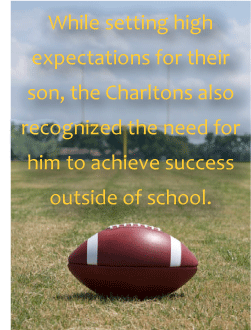 At Yale, Blake majored in English Language and Literature and completed all the premedical courses and requirements. By senior year, his writing had generated so much praise and encouragement from his professors that Blake opted to bypass physical chemistry to work on a fantasy novel. In addition to graduating with highest honors, he won several prestigious awards from the English department and was elected to Phi Beta Kappa. After graduation, he continued to write, while working a variety of teaching, writing, and other jobs to support himself. “I was very happy to have the time to write,” he says, “but I felt very isolated from the world and like something was missing in life.” After his father was diagnosed with a rare form of cancer, Blake focused on helping him cope with his illness and “began to feel a calling to medicine.”
At Yale, Blake majored in English Language and Literature and completed all the premedical courses and requirements. By senior year, his writing had generated so much praise and encouragement from his professors that Blake opted to bypass physical chemistry to work on a fantasy novel. In addition to graduating with highest honors, he won several prestigious awards from the English department and was elected to Phi Beta Kappa. After graduation, he continued to write, while working a variety of teaching, writing, and other jobs to support himself. “I was very happy to have the time to write,” he says, “but I felt very isolated from the world and like something was missing in life.” After his father was diagnosed with a rare form of cancer, Blake focused on helping him cope with his illness and “began to feel a calling to medicine.”
When his father’s cancer went into remission, Blake followed his calling. He completed two preclinical years of classroom learning, dissection and practicing on trained actors, and two years of clinical training, rotating through all the major fields of medicine as a “clerk,” which he likens to an apprentice, working in teams with one or two doctors. He took every third month off from clinical duties to work on book three of his trilogy, which does not yet have a set release date, and help his mentor, the physician and best-selling author Abraham Verghese, on research and educational initiatives. Since completing his medical training, Blake, like Verghese, will pursue a dual career in writing and academic medicine.
Having spent the last 10 years on his trilogy, Blake plans to leave the world of Nicodemus Weal behind, after completing book three, to focus on a real-world issue that he knows well. “A project I’m really excited about,” he says, “is writing about people with disabilities.” Among these are fellow medical students whose dedication and perseverance trump their disabilities. One, a woman who lost both legs as a result of an accident in infancy, has a severe muscular/skeletal disability but has won numerous wheelchair marathons and is a resident in internal medicine at Brigham and Women’s Hospital in Boston. The other is a man with an abnormally shaped face, eight fingers, and no thumbs, the result of a developmental disability in the womb called Miller Syndrome. “His mind is neurotypical,” says Blake, “but he looks different, so he has been treated very cruelly as a result. Yet he got the highest marks in his surgical rotation.” Blake, by comparison, looks normal but has a neurological disability.
“Dyslexia has had a defining role in my life and career,” he says. “As a teenager and as a younger man, I fought against it, trying to escape it. Becoming a novelist and writing about disability–in what I hope is an accessible way for a wide spectrum of people–has changed much of that. These days I see the idiosyncrasies of my mind if not as a gift, then as a purpose–one that has led me to my two great passions: medicine and literature. Often we think about medicine as preventing something awful, but medicine can also remove barriers,” he says. “It can help people live a longer and fuller life. The best literature transports you into other eyes, times, and places. You live the life of Anna Karenina, the anguish of Achilles, when you can expand your life into others’ lives.”
Related
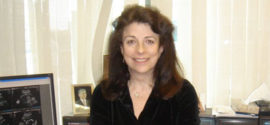
Beryl Benacerraf, M.D., Radiologist & Expert in Ultrasound During Pregnancy
A pioneer in radiology, particularly fetal ultrasonography, Dr. Benacerraf was among the first physicians to recognize the correlation between Down syndrome and physical signs, including an extra fold of skin on the fetus’s neck, as observed during an ultrasound. She is also the editor-in-chief of the Journal of Ultrasound in Medicine.
Read More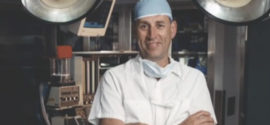
Delos “Toby” Cosgrove, M.D., Former President & CEO of Cleveland Clinic
Delos (“Toby”) M. Cosgrove, M.D., is president and chief executive officer of Cleveland Clinic. Under his leadership, Cleveland Clinic has experienced improved clinical outcomes and increased patient satisfaction, and expanded locally, nationally and internationally. Dr. Cosgrove has enacted policies focused on quality improvement, improved patient experience, and greater transparency and accountability at all levels of the organization.
Read More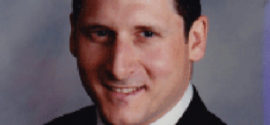
Tyler Lucas, M.D., Chief of Orthopedic Surgery at Metropolitan Hospital & Lincoln Med..
Tyler Lucas is a member of the Alpha Omega Alpha Honor Society, an honor he received as a fourth-year medical student. He also received the Golden Scalpel award as a surgical resident for outstanding achievements in surgery. The impact that Dr. Lucas has on his patients’ lives is immeasurable. Many times, he is giving them their lives back, by restoring their freedom to move as they had before their injuries.
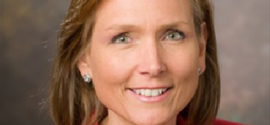
Karen Santucci, M.D., Children’s Emergency Department Medical Director & Sectio..
As a resident, Dr. Karen Santucci was nominated for and honored with admission in the prestigious medical honor society, Alpha Omega Alpha (AA). Throughout her career, Santucci has received numerous awards for her outstanding work in pediatric emergency medicine. In addition, she created AMISTAD, a program that brings in adolescent and teenage students from local area schools to act as patients so that Yale’s medical students can develop their training and learn to work with an often-challenging age group.
